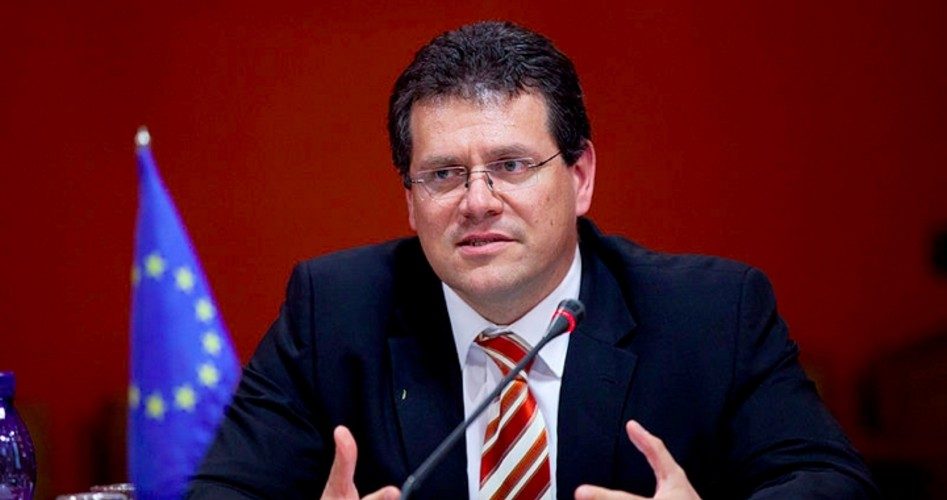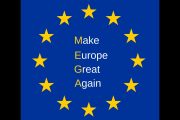
As reported here this week, the first round of Transatlantic Trade and Investment Partnership (TTIP) negotiations has been underway in Washington, D.C. with European Union and American officials, along with a select group of business, banking, environmental, and union “stakeholders.” President Obama has placed this planned political and economic merger of the EU and the United States on a fast track, with the intention of building support for it over the coming months so that it can be rammed through Congress next year.
Despite constant claims of commitment to “transparency,” “openness” and “democracy,” the TTIP talks have been conducted under a cloak of secrecy, with the negotiations closed to the press and the negotiated texts and documents unavailable to the public. This is standard operating procedure in the EU (see here, here, and here) which the United States would mirror more and more, should the TTIP merger succeed.
On Thursday, July 11, the fourth day of the TTIP talks in Washington, a top EU official made some interesting admissions during a speech in Europe. Addressing Lithuanian legislators in Vilnius, the nation’s capital, European Commission Vice-President for Inter-institutional Affairs and Administration Maros Sefcovic (shown above) explained the role of national parliaments under the new regime instituted by the so-called economic reforms known as the “Six-Pack” (2011) and the “Two-Pack” (2012). According to Sefcovic, due to the economic crisis, these reforms required an increased “pooling of sovereignty” by the member states of the eurozone. This means, among other things, that their national budgets will be scrutinized and approved or disapproved by the troika of the European Commission, the European Central Bank (ECB), and the International Monetary Fund (IMF). It is the job of national parliaments, Sefcovic said, in essence, to rubberstamp the decisions of the troika, thereby providing a façade of democratic legitimacy. And, ah yes, the parliaments are also supposed to organize “Europe days” confabs to discuss and debate the wonderful work and vision of the European Commission. Sefcovic told the parliament members that even more changes are headed their way:
The Euro currency is stable again. But the crisis has not gone away completely, of course, and we have to continue to follow these new rules if we want to ensure that it does not return.
And there are still more changes to be expected en route. For example, we will soon be entering a new phase of relations between national governments, national parliaments and the European Commission, when the first national budget proposals are scrutinised at the European level, as agreed as part of the ‘two-pack’.
This is a new procedure, and one born out of necessity — one of the key causes of the crisis was irresponsible budgeting in some Member States that had a knock-on effect in other countries. European level scrutiny of national budgets is designed to stop this from happening again.
This is an excellent example of just how far we have come, how far we have been willing to find new ways to do what needs to be done. Pooling sovereignty in this way would have been unthinkable a few years ago, and yet now it is likely to be the model for future development of the economic and monetary union.
That last sentence, especially, deserves a repeat: “Pooling sovereignty in this way would have been unthinkable a few years ago, and yet now it is likely to be the model.”
What Sefcovic and the EU officials in Brussels and Strasbourg refer to as “pooling sovereignty” is, of course, a very radical process that has been fundamentally transforming the relationship between the EU and its member states. The principal-agent relationship has been reversed, with the EU now assuming the principal position, and the member nations becoming the agents, although many critics say the master-servant description is now more apropos. National sovereignty has been, in effect, defined out of existence in the EU. That is precisely what is also in store for Americans, if we accept the TTIP.
“Since the onset of the euro crisis, we have witnessed a massive transfer of powers to the EU level,” notes the European Council on Foreign Relations (ECFR), in a policy brief entitled, “What Is Political Union?”
It acknowledges that the European Central Bank’s recent intervention in national pension reform and labor markets “revealed the extent to which the ECB was acting as a shadow government.”
After surveying the new powers conferred by the Six-Pack and the Two-Pack agreements, the ECFR brief notes: “The shift does not stop there.” It then outlines a number of additional new power transfers in the works, and then observes: “There is still more to come: the EU is currently discussing plans for economic, fiscal, and banking union….”
“The fear now,” according to the ECFR brief, “is that European leaders might end up sitting at the top of an economic federation without the political structures that would democratically legitimise it.”
“The fear now”? Fear by whom? The ECFR is speaking for the EU’s ruling class, of course. The European Union’s political structures — they say — are still not big enough and powerful enough to handle all of the “crises” besetting the EU. National and local governments are getting in the way of the EU ruling class’s grand plans. This “structural flaw” will be remedied by constant accretions of power. But, as the ECFR brief outlines, there are differences of opinion among the EU ruling elites concerning the various federalist models and the timetables for achieving complete centralization of political and economic power. Regardless of the model and timetable chosen, the point is that the EU’s ruling elite view this evolution as an ongoing “process,” an irreversible process that will ineluctably lead to the formerly independent nation states becoming total and abject vassals of a superstate in Brussels.
Maros Sefcovic was careful to put a smiley face on this new vassalage, calling the EU’s new national servitors “partners in this process” — as he explained to them their new role in the unfolding drama scripted by the shadow government in Brussels:
We will all need to play our part in explaining to the citizens of Europe just what these proposals will mean and how parliaments at national and European levels will play a full part in the process. This will of course be even more necessary as we move deeper into economic and monetary union — as for example with our proposals for a full banking union….
As I said, we are all partners in this process, and can all contribute much to the debate; the more regularly and effectively we can do that, the better it will be for us all!
Audacity, deception and guile
“Twenty years ago, when the process began, there was no question of losing sovereignty. That was a lie, or at any rate, a dishonest obfuscation.” So wrote British columnist/commentator Sir Peregrine Worsthorne, in London’s Sunday Telegraph, on August 4, 1991.
Worsthorne, an erstwhile supporter of the Common Market (as the EU was previously known), made the comment above a few months before the official adoption of the 1992 Single European Act (SEA). He recognized by then that the process of economic and monetary union to be set in motion by the SEA was a trap that would lead inexorably to political union, and a deathblow to national sovereignty and independence.
Especially since the launch of the euro currency, on January 1, 1999, many of the EU’s top architects and leaders have repeatedly confirmed in word what is already obvious by their deeds: that the “European Project” is a continuous process that will, if carried to their intended conclusion, eradicate all remaining vestiges of national sovereignty and render all EU inhabitants subject to the untrammeled powers of rulers in Brussels.
With the launch of the euro currency, Wim Duisenburg, president of the European Central Bank, matter-of-factly told The Daily Telegraph, on January 1, 1999: “From now on, monetary policy, usually an essential part of national sovereignty, will be decided by a truly European institution.”
In the same Daily Telegraph article, French Finance Minister Dominique Strauss-Kahn approvingly declared: “The Euro is a conquest of sovereignty. It gives us a margin of manoeuvre. It’s a tool to help us master globalisation and help us resist irrational shifts in the market.”
Gerhard Schröder, who was then chancellor of Germany, proclaimed in January 1999:
The time for individual nations having its own tax, employment and social policies if definitely over. We must finally bury the erroneous ideas of nations having sovereignty over foreign and defence policies. National sovereignty will soon prove itself to be a product of the imagination.
(Schröder, by the way, has turned his German and EU politicking into a profitable second career, as chairman of the board of Nord Stream AG, the giant Russian-EU gas pipeline project he had championed while chancellor — along with Vladimir Putin. Putin’s energy behemoth, Gazprom, owns 51 percent of Nord Stream and Gazprom Chairman Alexei Miller — along with fellow Putin oligarchs Alexander Medvedev and Vlada Russakova — sits on the board. Nord Stream’s managing director is Matthias Warnig, for decades a member of the Stasi, the former Communist East Germany’s secret police. Warnig and Putin worked together, while Putin was a KGB agent in Germany. With help from Putin’s Kremlin, Warnig jumped from Stasi agent to chairman of the board of the Russian branch of Dresdner Bank, one of Germany’s largest banks.)
Shröder’s vision of an all-powerful EU central government is shared by his successor, Angela Merkel, who told reporters in 2012:
My vision is one of political union…. We need to become incrementally closer and closer, in all policy areas… Over a long process, we will transfer more powers to the [European] Commission, which will then handle what falls within the European remit like a government of Europe.
Collapsing trust and confidence
The citizens of the EU countries have only recently begun to grasp the grim reality of what this vision would mean. But it has finally struck them hard. A recent study by the European Council on Foreign Relations entitled “The Continent-wide Rise of Euroscepticism” laments the fact that in virtually every EU country trust in the EU has plummeted dramatically. The ECFR study reports:
It was once seen as a British disease. But Euroscepticism has now spread across the continent like a virus. As data from Eurobarometer shows, trust in the European project has fallen even faster than growth rates. Since the beginning of the euro crisis, trust in the European Union has fallen from +10 to -22 percent in France, from +20 to -29 percent in Germany, from +30 to -22 percent in Italy, from +42 to -52 percent in Spain, from +50 to +6 percent in Poland, and from -13 to -49 percent in the United Kingdom.
“What is so striking,” admit the ECFR authors, “is that everyone in the EU has been losing faith in the project: both creditors and debtors, and eurozone countries, would-be members, and ‘opt-outs’. Back in 2007, people thought that the UK, which scored -13 percent in trust, was the Eurosceptic outlier. Now, remarkably, the four largest eurozone countries have even lower levels of trust in the EU institutions than Britain did back in 2007.”
Why should we join the disaster?
With dissatisfaction within the EU being so widespread, and with the EU architects so brazenly transforming what they originally promoted as a common market into a full-fledged central government, Americans might be wise to take a long, hard look at what is now being offered in the form of the much-hyped Transatlantic Trade and Investment Partnership. As we reported previously (Transatlantic Danger: U.S.-EU Merger Talks Underway in D.C.), the key impetus for the TTIP in this country is being provided by the Council on Foreign Relations (CFR) and its many banking, business, and think tank adjuncts. And we documented many years ago (United States of Europe) that the American CFR played a central role, following World War II, in launching the movement for an European Common Market and a European Union.
In September 2000 the mainstream media discovered that the post-war movement for a united Europe had been funded by the American CIA. What these MSM articles failed to mention was that all of the top CIA individuals mentioned in the newly released documents — William Donovan, Walter Bedell Smith, Allen Dulles, Paul Hoffman — were also key leaders in the CFR and were carrying out the CFR’s designs.
This merely confirmed what the late Hilaire du Berrier, a longtime contributing editor to The New American (and its predecessors American Opinion and The Review of the News) had been documenting for decades in his authoritative HduB Reports, which he published from Monte Carlo, Monaco.
“The CFR,” wrote du Berrier in January 1973, “saw the Common Market from the first as a regional government to which more and more nations would be added until the world government which the UN had failed to bring about would be realized. At a favorable point in the Common Market’s development, America would be brought in. But the American public had to be softened first and leaders groomed for the change-over.”
Nearly 20 years later, in 1991, German Foreign Minister Hans-Dietrich Genscher, an avid advocate of the EU superstate, validated du Berrier’s point, in an address in Lisbon, Portugal, entitled “The Future of Europe,” in which he declared:
The road points not backward to the nation-state of the past…. Basically, it is a matter of constructing a world order of peace in which the United Nations must at last play the central role assigned it in its Charter.
The CFR and ECFR are doing their best now to, as Hilaire du Berrier foresaw, “soften” the American public, so that the United States may be brought into “The Project.”
Photo: Maros Sefcovic
Related articles:
Transatlantic Danger: U.S.-EU Merger Talks Underway in D.C.
Obama, Cameron, Barroso Push EU-US Merger at G8 Ireland Summit
CFR Applauds European Union’s “Real Subversion of Sovereignty”


